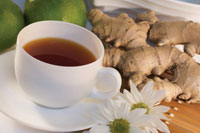
Ginger Tea Revered around the world for its pungent taste, ginger (Zingiber officinale) is a natural spice that is also widely prized for its medicinal properties. Since ancient times, traditional healers in a diverse array of cultures have used this plant primarily to help settle upset stomachs.
Chinese herbalists have relied on ginger as a medicine and flavoring for more than 2,500 years. The early Greeks mixed it into breads (hence the first gingerbread), and North American colonists sipped nausea-quelling ginger beer, the precursor of modern ginger ale. Today, many cultures continue to rely on ginger for controlling nausea and also for reducing inflammation.
A botanical relative of marjoram and turmeric, the ginger plant is indigenous to Southeast Asia and is now also extensively cultivated in Jamaica and other tropical areas. It’s the plant’s aromatic rhizome (or underground stem) that’s used for culinary and medicinal purposes.
Health Benefits Ginger’s effectiveness as a digestive aid is due largely to its active ingredients: gingerols and shogaols. These substances help to neutralize stomach acids, enhance the secretion of digestive juices (stimulating the appetite), and tone the muscles of the digestive tract. Research confirms the presence of anti-inflammatory properties in ginger as well.